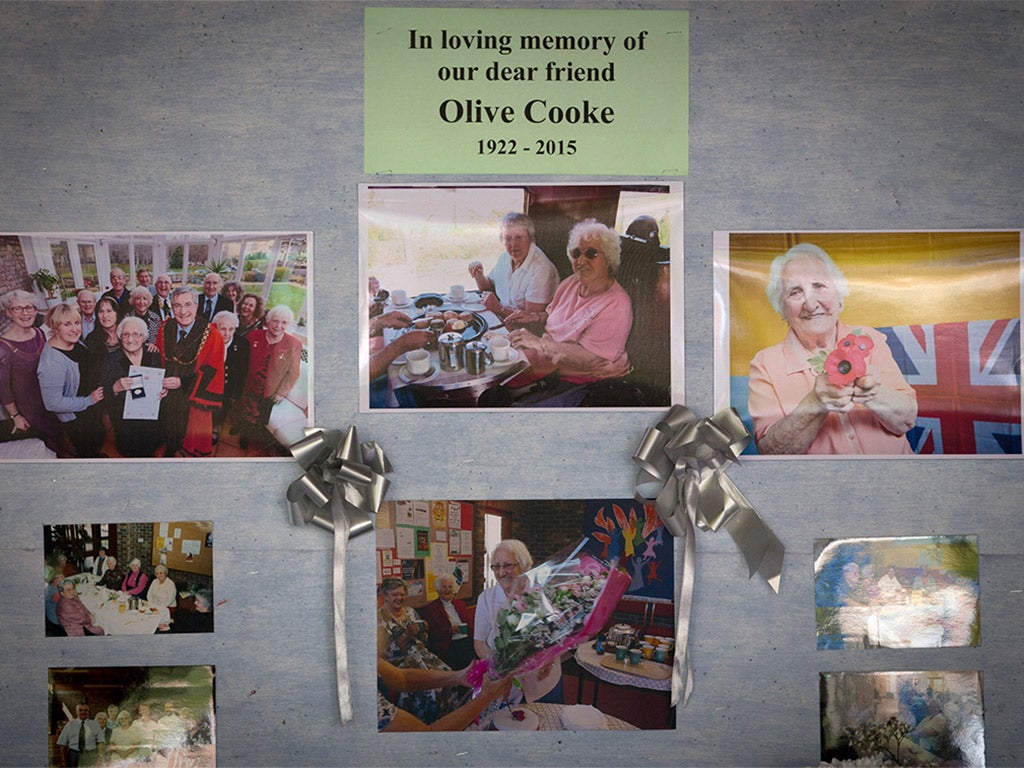Olive Cooke: Poppy seller who killed herself after deluge of cold calls had her details sold by professional database companies
Exclusive: Mrs Cooke was found dead near the Clifton Suspension Bridge in Bristol in May

Olive Cooke, the poppy seller whose suicide at the age of 92 had been linked to a deluge of requests for donations from charities, had her details sold by more than 20 professional database companies, The Independent has learnt.
Mrs Cooke, Britain’s longest-serving poppy seller, was found dead near the Clifton Suspension Bridge in Bristol in May. While her family has made it clear that they do not blame the charities for her death, they did criticise them initially for bombarding her with cold calls and hundreds of letters every month.

Her case sparked hundreds of complaints about “hounding” by charities, with particular concerns around those that shared donors’ contact details. A draft report into her case by the Fundraising Standards Board, seen by The Independent, reveals that Mrs Cooke’s details were on the databases of at least 22 professional data suppliers, known as list brokers. These are firms who buy and sell addresses and phone numbers of people to companies and charities for profit.
The large number of firms trading Mrs Cooke’s details explains how she came to be contacted by so many organisations asking her to give to their causes.
As well as buying the names of generous donors such as Mrs Cooke from broker companies, charities also sell or swap them to each other.
In Mrs Cooke’s case, the report says: “Seventy charities reported that Mrs Cook’s details were secured via a third party. Of those, 29 sourced her details from a list procured from a fellow charity, 26 from a list broker and 14 by exchanging contact data with fellow charities.”
The draft report says that between 2000 and 2014 the number of requests she received for donations tripled to more than 460 a year at its peak last year. The report is subject to revision as more charities respond, and the FRSB declined to comment on its contents. Originally due this month, it is now not expected to be published until the new year.
Over the past five years, Mrs Cooke was contacted by more than 70 charities a year – up from just 20 in 2000, the report says. It blames the rise primarily on the use of list brokers and charity lists.
Of the 1,724 charities the Fundraising Standards Board contacted, 99 said they had Mrs Cooke’s details. However, it also says she was a generous donor, having supported 88 charities in her time.
Andrew Hind, chair of the FRSB, writes in the report: “Mrs Cooke’s experiences demonstrate the inevitable consequences of a fundraising regime where charities have been able to exchange, and in some cases sell, the personal details of donors to each other...a situation where a donor to a small number of charities can find themselves, after a period of time, receiving mail packs and phone calls from an ever-growing and uncontrollable number of fundraising charities.”
As a result of the media furore around Mrs Cooke, the Government commissioned a report into UK fundraising by Sir Stuart Etherington, chief executive of the National Council for Voluntary Organisations. He recommended the self-regulatory FRSB should be replaced by a new independent watchdog.
The FRSB published an interim report in June, setting out 17 recommendations including tightening up data-sharing rules, taking a tougher stance against hard-selling and setting out clearer guidelines for dealing with vulnerable donors.
Hit list: The role of brokers
Charities struggling to raise money through their own supporters have increasingly turned to outside agencies including list brokers. These specialise in compiling lists of people’s contact details which they sell either to charities or to companies.
For charities, they provide not only provide “leads” but a way to bring in extra cash by selling on the details of their own loyal donors.
After Olive Cooke’s death, many people complained to the Fundraising Standards Board about these agencies, saying they had no idea their details would be shared with other organisations. The FRSB recommended donors should always be informed if sharing is a possibility.
Join our commenting forum
Join thought-provoking conversations, follow other Independent readers and see their replies
Comments
Bookmark popover
Removed from bookmarks